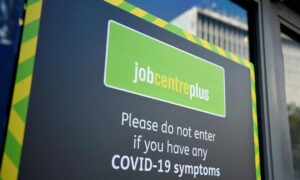Unemployment rose to 4.5% in the three months to August as the total number of jobless rose by 138,000, the Office for National Statistics (ONS) said.
The jobless rate, slightly higher than expected, was up from 4.1% the month before and the increase in unemployment took the total to 1.52 million.
Data also suggested that, in September, there were 673,000 fewer people on UK payrolls than in March when the coronavirus lockdown started.
Speaking about the ONS announcement, Jeremy Thomson-Cook, Chief Economist at Equals Money said: “You don’t need to be an economist to see the issues within the UK labour market summarised in today’s figures; a benefits claimant count of 2.7 million people driven by a record 114,000 redundancies on the quarter suggest that the end of the furlough scheme has come at a time where businesses are unable to hold on to staff.
“The wider unemployment rate has ticked higher but remains heavily sedated by the furlough scheme and we expect a push towards the 9% level – a doubling of current unemployment levels – in the coming 6-12 months.
“As we head into another wider period of increased lockdowns we have to remain cognisant of the effect of these weaknesses on consumer confidence, business investment levels and the impact of inflation possible in some Brexit scenarios. For a lot of people caught up in this unemployment survey, winter is going to be very tough.”
Louise Deverell-Smith, founder of Daisy Chain, added her thoughts saying: “It’s no surprise to see the latest ONS figures continue to paint a negative picture of the UK’s labour market. News of businesses cutting jobs throughout the summer is finally materialising in the numbers, and they may get worse before they get better.
“But there is hope. As we move towards the end of the furlough scheme, now is the time for businesses and workers to show creativity and resilience. Changes toward more flexible working can create job opportunities and provide a silver lining around these dark clouds. Businesses can offer part-time roles through the Jobs Support Scheme, while workers can adapt to flexible working arrangements.
“The government has also announced a series of measures to support jobseekers. Both the lifetime skills guarantee and the JETS (Job Entry Targeted Support) scheme should help retrain and reskill the workforce in roles which are viable within a new economy. Combined with a greater focus on flexible and part-time working opportunities the UK economy and jobs market will recover.”
